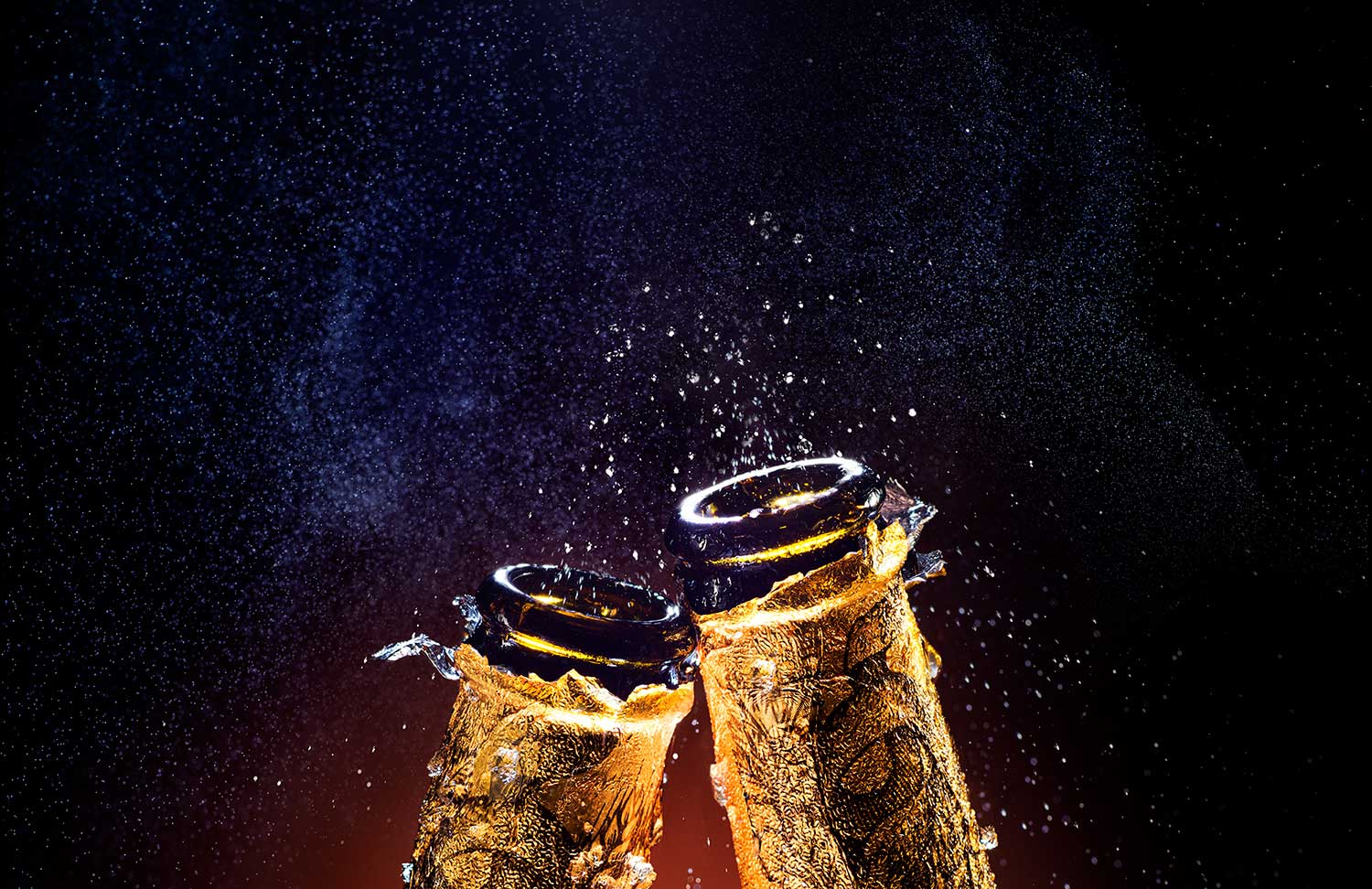LEFFE BIRRA O LEGGENDA?
immagini realizzate con Hasselblad h6d 100 + hts luci Broncolor
Negli anni ’50 ebbe luogo un incontro, che tutti gli amanti della birra dovrebbero celebrare alzando il loro calice di Leffe. Fu quello tra Padre Abate Nys dell’Abbazia di Leffe e Albert Lootvoet, un mastro birraio di consolidata esperienza. Appassionato dalla storia dell’abbazia, Padre Nys era addolorato perché, dopo la visita non molto amichevole delle truppe rivoluzionarie francesi, la birreria era lentamente andata in rovina finché, nel 1809, dovette chiudere i battenti. Un simile tesoro non poteva cadere nell’oblio. Occorreva far rivivere la birra di Leffe. La sfida fu raccolta con entusiasmo dal Padre e dal Mastro Birraio. Poco tempo dopo, la produzione della birra Leffe riprese con ottimi risultati. Dopo la Leffe Brune, una birra dorata come il sole d’estate cominciò a scorrere nei bicchieri, era la Leffe Blonde. Una delle più belle pagine della storia di Leffe.
La birra è una bevanda molto amata in diversi Paesi. Se sei qui, probabilmente anche tu sei un appassionato di questa bevanda, una buona pinta di birra può rendere migliore qualunque serata. Sei felice? Vai a farti una birretta con i tuoi amici! Hai avuto una giornata storta? Una bella birra non può che essere una consolazione.
La birra occupa un posto decisamente gradevole nella nostra routine quotidiana, ma forse non sai quanto fosse importante per gli antichi questa bevanda. Molte culture hanno riservato tradizioni speciali per lei: leggende, aneddoti, superstizioni, per alcuni era addirittura connessa alla vita.
La civiltà sumera poteva già vantare diversi tipi di birra: una più comune con la quale veniva pagato il lavoro degli operai e una birra dai toni più delicati che veniva riservata alle donne. La birra era davvero importante nella vita dei sumeri, era credenza popolare che avesse delle proprietà mistiche. Esisteva anche una dea della birra chiamata Ninkasi.
Con il successivo arrivo dei Babilonesi, la birra acquisì un ruolo ancora più importante: nel codice di Hammurabi, che conteneva tutte le leggi dell’impero, si parla dell’importanza della birra. Non solo, chiunque avesse osato intaccare la purezza della bevanda sarebbe stato condannato a morte. Incredibile. Loro sì che amavano davvero la birra.
Nell’antico Egitto era considerata come una concessione della dea dei cereali e aveva quindi un origine divina. La sacralità della birra era talmente sentita che se ne faceva uso dalla nascita alla morte. I bambini la bevevano regolarmente, veniva regalata loro una piccola anfora che avrebbe indicato la giusta dose quotidiana concessa. Non solo: si credeva che la birra concedesse il dono dell’immortalità e le persone di potere come i faraoni e i sacerdoti, che potevano avere accesso a tale privilegio, ne portavano sempre un’anfora nelle loro lussuose tombe.
Non finisce qui: la birra è stata anche oggetto di superstizione, soprattutto nei paesi nordici. Era credenza popolare che attirasse spiriti maligni e che andasse protetta. In alcune leggende era sufficiente spargere del mosto agli angoli del locale per cacciarli, in altre un gatto era la perfetta guardia notturna per la birra in fermentazione: la sua presenza avrebbe impedito agli spiriti di rubare e inacidire la birra. Da non dimenticare anche diverse leggende con protagonisti gli Dei nordici, una delle quali narra delle gesta della figlia di Tyr, la quale aiutò Thor a trovare il giusto recipiente che potesse contenere la sacra birra degli dei. La birra veniva considerata la bevanda dei guerrieri, Odino in persona consigliava di berla.
In Irlanda la birra scorrerebbe a fiumi in una Terra paradisiaca con molti nomi, i più famosi sono “Oltremondo” e “Avalon”, dove non ci sono malattie e sofferenze e regna sempre la primavera. La birra era considerata la bevanda delle bevande, un sogno insuperabile.
Da menzionare anche un’antica leggenda finlandese, secondo cui una ragazza di nome Osmotar avrebbe scoperto il segreto della fermentazione con riti simbolici e di natura sessuale.
Infine, anche l’Italia ha i suoi miti legati alla birra, presenti soprattutto in Trentino Alto Adige. Qui, la birra avrebbe un ruolo molto importante all’inizio di un nuovo raccolto: per avere fortuna con la nuova stagione, i contadini irroravano i campi con grandi quantità di birra, per poi condividerla tutti insieme in un grande boccale.
Inoltre, si credeva che la birra andasse bevuta in un certo modo: per renderle giustizia andava consumata in piedi e alla luce del sole, così da proteggerla da spiriti dispettosi che non aspettavano altro che inacidirla.
La birra, era anche considerata una bevanda empatica: doveva essere bevuta di buon umore, altrimenti il nostro malessere sarebbe passato alla bevanda e avrebbe rovinato il clima della festa.

LEFFE BEER OR LEGEND?
In the 1950s a meeting took place, which all beer lovers should celebrate by raising their glass of Leffe. It was the one between Father Abate Nys of the Abbey of Leffe and Albert Lootvoet, a well-experienced brewmaster. Passionate about the history of the abbey, Father Nys was saddened because, after the not very friendly visit of the French revolutionary troops, the brewery had slowly fallen into disrepair until, in 1809, it had to close its doors. Such a treasure could not fall into oblivion. Leffe’s beer had to be revived. The challenge was taken up with enthusiasm by the Father and the Brewmaster. Shortly after, the production of Leffe beer resumed with excellent results. After the Leffe Brune, a beer as golden as the summer sun began to flow in the glasses, it was the Leffe Blonde. One of the most beautiful pages in Leffe’s history.
Beer is a very popular drink in many countries. If you are here, you are probably a fan of this drink too, a good pint of beer can make any evening better. You are happy? Go have a beer with your friends! Did you have a bad day? A nice beer can only be a consolation.
Beer occupies a very pleasant place in our daily routine, but you may not know how important this drink was to the ancients. Many cultures have reserved special traditions for her: legends, anecdotes, superstitions, for some she was even connected to life.
The Sumerian civilization could already boast different types of beer: a more common one with which the labor of the workers was paid and a more delicate beer that was reserved for women. Beer was really important in the life of the Sumerians, it was popular belief that it had mystical properties. There was also a goddess of beer called Ninkasi.
With the subsequent arrival of the Babylonians, beer acquired an even more important role: in the code of Hammurabi, which contained all the laws of the empire, the importance of beer is mentioned. Not only that, anyone who dared to affect the purity of the drink would be sentenced to death. Incredible. They really loved beer.
In ancient Egypt it was considered a concession from the goddess of cereals and therefore had a divine origin. The sacredness of beer was so felt that it was used from birth to death. The children drank it regularly, they were given a small amphora that would indicate the right daily dose granted. Not only that: it was believed that beer granted the gift of immortality and people of power such as pharaohs and priests, who could have access to this privilege, always carried an amphora to their luxurious tombs.
It doesn’t stop there: beer has also been the subject of superstition, especially in the Nordic countries. It was popular belief that it attracted evil spirits and that it should be protected. In some legends it was enough to sprinkle wort on the corners of the room to chase them away, in others a cat was the perfect night guard for the fermenting beer: its presence would have prevented the spirits from stealing and souring the beer. Do not forget also several legends starring the Norse Gods, one of which tells of the deeds of Tyr’s daughter, who helped Thor find the right container that could contain the sacred beer of the gods. Beer was considered the drink of warriors, Odin himself recommended drinking it.
In Ireland, beer would flow freely in a heavenly land with many names, the most famous being “Oltremondo” and “Avalon”, where there are no diseases and sufferings and spring always reigns. Beer was considered the drink of beverages, an unsurpassable dream.
Also worth mentioning is an ancient Finnish legend, according to which a girl named Osmotar would have discovered the secret of fermentation with symbolic and sexual rites.
Finally, Italy also has its own myths related to beer, present above all in Trentino Alto Adige. Here, beer would play a very important role at the beginning of a new harvest: to be lucky with the new season, the farmers sprayed the fields with large quantities of beer, and then shared it all together in a large mug.
Furthermore, it was believed that beer should be drunk in a certain way: to do it justice it should be consumed standing up and in the sunlight, so as to protect it from spiteful spirits who were waiting for nothing but sour it.
Beer was also considered an empathic drink: it had to be drunk in a good mood, otherwise our discomfort would pass to the drink and ruin the atmosphere of the party.

